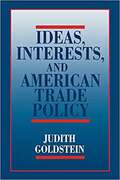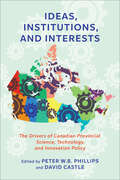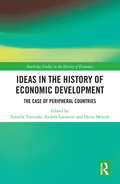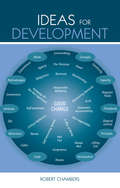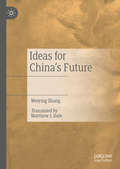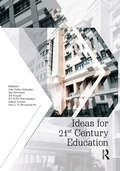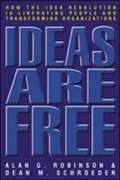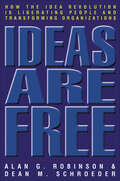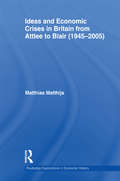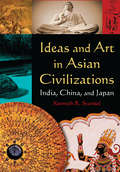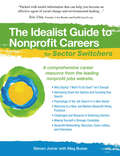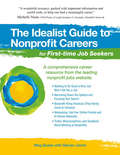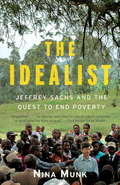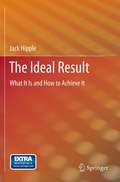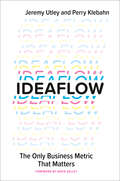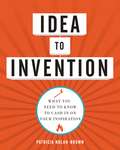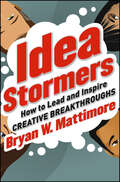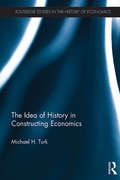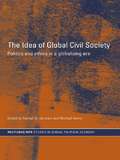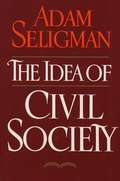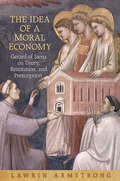- Table View
- List View
Ideas, Interests and Foreign Aid
by A. Maurits van der VeenWhy do countries give foreign aid? Although many countries have official development assistance programs, this book argues that no two of them see the purpose of these programmes in the same way. Moreover, the way countries frame that purpose has shaped aid policy choices past and present. The author examines how Belgium long gave aid out of a sense of obligation to its former colonies, The Netherlands was more interested in pursuing international influence, Italy has focused on the reputational payoffs of aid flows and Norwegian aid has had strong humanitarian motivations since the beginning. But at no time has a single frame shaped any one country's aid policy exclusively. Instead, analysing half a century of legislative debates on aid in these four countries, this book presents a unique picture both of cross-national and over time patterns in the salience of different aid frames and of varying aid programmes that resulted.
Ideas, Interests, And American Trade Policy (Cornell Studies In Political Economy)
by Judith GoldsteinTo citizens and political analysts alike, United States trade law is an incoherent conglomeration of policies, both liberal and protectionist. Seeking to understand the contradictions in American policy, Judith Goldstein offers the first book to demonstrate the impact of the political past on today's trade decisions. As she traces the history of trade agreements from the antebellum era through the 1980s, she addresses a fundamental question: What effects do shared ideas about economics - as opposed to national power or individual self-interest - have on the institutions that make and enforce trade law? Goldstein argues that successful ideas become embedded in institutions and typically outlive the time during which they served social interests. She sets the stage with a discussion of the shifting commercial policy of the first half of the nineteenth century. After examining the consequences of the Republican Party's decision to promote high tariffs between 1870 and 1930, she then considers in detail the political aftermath of the Great Depression, when the Democratic party settled on a reciprocal trade platform. Because the Democrats did not completely dismantle the existing system, however, the combined legacies of protection and openness help examine the intricacies in the forms of protectionism that political leaders have advocated since World War II. Readers in such fields as political science, political economy, policy studies and law, international relations, and American history will welcome Ideas, Interests, and American Trade Policy.
Ideas, Institutions, and Interests: The Drivers of Canadian Provincial Science, Technology, and Innovation Policy
by Peter W.B. Phillips David CastleCanada’s thirteen provinces and territories are significant actors in Canadian society, directly shaping cultural, political, and economic domains. Regions also play a key role in creating diversity within innovative activity. The role of provinces and territories in setting science, technology, and innovation policy is, however, notably underexplored. Ideas, Institutions, and Interests examines each province and territory to offer real-world insights into the complexity and opportunities of regionally differentiated innovation policy in a pan-continental system. Contributing scholars detail the distinctive ways in which provinces and territories articulate ideas and interests through their institutions, programs, and policies. Many of the contributing authors have engaged first-hand with either micro- or macro-level policy innovation and are innovation leaders in their own right, providing invaluable perspectives on the topic. Exploring the vital role of provinces in the last thirty years of science, technology, and innovation policy development and implementation, Ideas, Institutions, and Interests is an insightful book that places innovation policy in the context of multilevel governance.
Ideas in the History of Economic Development: The Case of Peripheral Countries (Routledge Studies in the History of Economics)
by Estrella Trincado Andrés Lazzarini Denis MelnikThis edited volume examines the relationship between economic ideas, economic policies and development institutions, analysing the cases of 11 peripheral countries in Europe, Latin America and Asia across the nineteenth and twentieth centuries. It sheds light on the obstacles that have prevented the sustained economic growth of these countries and examines the origins of national and regional approaches to development. The chapters present a fascinating insight into the ideas and visions in the different locations, with the overarching categories of economic nationalism and economic liberalism and how they have influenced development outcomes. This book will be valuable reading for advanced students and researchers of development economics, the history of economic thought and economic history.
Ideas in Context: Free Trade and Its Enemies in France, 1814–1851
by David ToddIn the aftermath of the French Revolution, advocates of protection against foreign competition prevailed in a fierce controversy over international trade. This groundbreaking study is the first to examine this 'protectionist turn' in full. Faced with a reaffirmation of mercantile jealousy under the Bourbon Restoration, Benjamin Constant, Jean-Baptiste Say and regional publicists advocated the adoption of the liberty of commerce in order to consolidate the new liberal order. But after the Revolution of 1830 a new generation of liberal thinkers endeavoured to reconcile the jealousy of trade with the discourse of commercial society and political liberty. New justifications for protection oscillated between an industrialist reinvention of jealousy and an aspiration to self-sufficiency as a means of attenuating the rise of urban pauperism. A strident denunciation of British power and social imbalances served to defuse the internal tensions of the protectionist discourse and facilitated its dissemination across the French political spectrum.
Ideas for Development
by Robert ChambersOur world seems entangled in systems increasingly dominated by power, greed, ignorance, self-deception and denial, with spiralling inequity and injustice. Against a backdrop of climate change, failing ecosystems, poverty, crushing debt and corporate exploitation, the future of our world looks dire and the solutions almost too monumental to consider. Yet all is not lost. Robert Chambers, one of the ?glass is half full? optimists of international development, suggests that the problems can be solved and everyone has the power at a personal level to take action, develop solutions and remake our world as it can and should be. Chambers peels apart and analyses aspects of development that have been neglected or misunderstood. In each chapter, he presents an earlier writing which he then reviews and reflects upon in a contemporary light before harvesting a wealth of powerful conclusions and practical implications for the future. The book draws on experiences from Africa, Asia and elsewhere, covering topics and concepts as wide and varied as irreversibility, continuity and commitment; administrative capacity as a scarce resource; procedures and principles; participation in the past, present and future; scaling up; behaviour and attitudes; responsible wellbeing; and concepts for development in the 21st century.
Ideas for China’s Future
by Weiying ZhangThis book attempts to convey that ideas matter and China needs right ideas to defeat wrong ideas and to guide its future reform. The successes that China has accomplished over the last 40 years of reform and opening were the result of ideas defeating interests. After the end of the “Cultural Revolution,” Deng Xiaoping initiated market-oriented Reform and Opening because he had new ideas. While China has made great progress in both economic and social development since the beginning of reform and opening, there is still a long way to go to become a liberal society. Although the ideas of political leaders are crucial in the short term for social transformation to take place, the ideas of the common people play a more important role in the long term. The types of new ideas that China needs are proposed in this book.
Ideas for 21st Century Education: Proceedings of the Asian Education Symposium (AES 2016), November 22-23, 2016, Bandung, Indonesia
by Ade Gafar Abdullah Ida Hamidah Siti Aisyah Ari Arifin Danuwijaya Galuh Yuliani Heli S.H. MunawarohIdeas for 21st Century Education contains the papers presented at the Asian Education Symposium (AES 2016), held on November 22—23, 2016, in Bandung, Indonesia. The book covers 11 topics: <P><P>1. Art Education (AED)2. Adult Education (ADE)3. Business Education (BED)4. Course Management (CMT)5. Curriculum, Research and Development (CRD)6. Educational Foundations (EDF)7. Learning / Teaching Methodologies and Assessment (TMA)8. Global Issues in Education and Research (GER)9. Pedagogy (PDG)10. Ubiquitous Learning (UBL)11. Other Areas of Education (OAE)
Ideas Are Free: How the Idea Revolution is Liberating People and Transforming Organizations
by Alan G. Robinson Dean M. SchroederBecause they're doing the day-to-day work, front-line employees see many problems and opportunities their managers don't. But most organizations fail to realize this potentially extraordinary source of revenue-enhancing ideas.
Ideas Are Free: How the Idea Revolution is Liberating People and Transforming Organizations
by Alan G Robinson Dean M SchroederThe fact is, because they're the ones actually doing the day-to-day work front-line employees see a great many problems and opportunities that their managers don't. But most organizations do very poorly at tapping into this extraordinary potential source of revenue-enhancing, savings-generating ideas. Ideas Are Free sets out a roadmap for totally integrating ideas and idea management into the way companies are structured and operate. Alan Robinson and Dean Schroeder draw on their ten years experience with more than three hundred organizations in fifteen countries to show precisely how to design a system to take advantage of this virtually free, perpetually renewing font of innovation. Robinson and Schroeder deal with two fundamental principles of managing ideas that are highly counterintuitive - the importance of going after small ideas rather than big ones, and the problems with the most common reward schemes and how to avoid them. They describe how to make ideas part of everyone's job, and how to set up and run an effective process for handling ideas-how to take a good idea system and make it great. And they show how good idea systems have a profound impact on an organization's culture. At the end of each chapter they provide "Guerrilla Tactics for the Idea Revolutionary", actions to promote ideas that any manager can take on his or her own authority, and that require little or no resources.
Ideas and Economic Crises in Britain from Attlee to Blair (Routledge Explorations in Economic History #50)
by Matthias M MatthijsDuring the period from 1945 to 2005, Britain underwent two deep-seated institutional transformations when political elites successfully challenged the prevailing wisdom on how to govern the economy. Attlee and Thatcher were able to effectively implement most of their political platforms. During this period there were also two opportunities to challenge existing institutional arrangements. Heath's 'U-turn' in 1972 signalled his failure to implement the radical agenda promised upon election in 1970, whilst Tony Blair’s New Labour similarly failed to instigate a major break with the 'Thatcherite' settlement. Rather than simply retell the story of British economic policymaking since World War II, this book offers a theoretically informed version of events, which draws upon the literatures on institutional path dependence, economic constructivism and political economy to explain this puzzle. It will be of great interest to both researchers and postgraduates with an interest in British economic history and the fields of political economy and economic crisis more widely.
Ideas and Art in Asian Civilizations: India, China and Japan
by Kenneth R. StunkelThis work covers topics related to the exercise of influence by individuals and groups within organizations. It includes an introductory group of articles dealing with the nature of influence processes and power.
The Idealist.org Handbook to Building a Better World
by Idealist. Org Stephanie LandFrom the world's largest nonprofit networking website -- a resource that gives readers the tools they need to make a difference. Part career guide, part activist's handbook, The Idealist.org Handbook to Building a Better World provides tools and inspiration for anyone who wants to make a difference but doesn't know where to start. Inspired by Idealist.org's 600,000-member online community and their ongoing search for work that gives back to the world, this practical reference walks readers through the different ways they can get involved and the range of possibilities for applying one's interests and skills to meet their community's needs. Idealist.org's staff gives a comprehensive understanding of the issues, options, organizations, and resources so readers can be proactive, whether it's through one's current job, volunteering, donating, personal spending, board service, starting an organization, or changing careers.
The Idealist Guide to Nonprofit Careers for Sector Switchers
by Meg Busse Steven JoinerThe Idealist Guide to Nonprofit Careers for Sector Switchers is the comprehensive resource for transitioning professionals pursuing new career options in the nonprofit sector.Get indispensable advice, relevant strategies, and nonprofit-specific resources to strengthen your job search. Written by nonprofit career experts, The Idealist Guide is easily accessible and convenient to read. If you are a "mid-career transitioner," a "re-careerer," an "encore careerist," a "bridger," or a "sector switcher" this book is meant for you.Topics Include: Why Nonprofit? Myths and Facts About Nonprofits Nonprofit Hiring Practices The Challenge of Sector Switching Self and Career Assessment Networking Strategies Evaluating Organizational Culture Negotiating the Best Deal Starting Your Own Nonprofit Nonprofit Speak 101Written by the staff of Idealist.org with guest sections by other nonprofit experts.Idealist.org is the leading organization in the field of nonprofit careers. Idealist.org runs the website where people and organizations can exchange resources and ideas, locate opportunities and supporters, and take steps to turn their good intentions into action.
The Idealist Guide to Nonprofit Careers for First-time Job Seekers
by Steven Joiner Meg BusseInterested in exploring opportunities for meaningful work in the nonprofit sector?The Idealist Guide to Nonprofit Careers for First-time Job Seekers is a comprehensive resource for emerging professionals pursuing their first position in the nonprofit sector. Whether you are a current student, a recent graduate, or someone entering the workforce for the first time, this book will provide you with indispensable advice, relevant strategies, and nonprofit-specific resources to strengthen your job search. Written by nonprofit career experts, The Idealist Guide is designed to be easily accessible and convenient to read.Topics Include: Why Nonprofit? Mastering a Job Search Self and Career Assessment Networking Strategies Job Search Tools Evaluating Organizational Culture Interviews and First Impressions Negotiating the Best Deal Myths and Facts About Nonprofits Nonprofit Speak 101Written by the staff of Idealist.org with guest sections by other nonprofit experts.Idealist.org is the leading organization in the field of nonprofit careers. Idealist.org runs the website where people and organizations can exchange resources and ideas, locate opportunities and supporters, and take steps to turn their good intentions into action.
The Idealist
by Nina MunkNAMED ONE OF THE BEST BOOKS OF THE YEAR BY Bloomberg * Forbes * The SpectatorRecipient of Foreign Policy's 2013 Albie AwardA powerful portrayal of Jeffrey Sachs's ambitious quest to end global poverty "The poor you will always have with you," to cite the Gospel of Matthew 26:11. Jeffrey Sachs--celebrated economist, special advisor to the Secretary General of the United Nations, and author of the influential bestseller The End of Poverty--disagrees. In his view, poverty is a problem that can be solved. With single-minded determination he has attempted to put into practice his theories about ending extreme poverty, to prove that the world's most destitute people can be lifted onto "the ladder of development." In 2006, Sachs launched the Millennium Villages Project, a daring five-year experiment designed to test his theories in Africa. The first Millennium village was in Sauri, a remote cluster of farming communities in western Kenya. The initial results were encouraging. With his first taste of success, and backed by one hundred twenty million dollars from George Soros and other likeminded donors, Sachs rolled out a dozen model villages in ten sub-Saharan countries. Once his approach was validated it would be scaled up across the entire continent. At least that was the idea. For the past six years, Nina Munk has reported deeply on the Millennium Villages Project, accompanying Sachs on his official trips to Africa and listening in on conversations with heads-of-state, humanitarian organizations, rival economists, and development experts. She has immersed herself in the lives of people in two Millennium villages: Ruhiira, in southwest Uganda, and Dertu, in the arid borderland between Kenya and Somalia. Accepting the hospitality of camel herders and small-hold farmers, and witnessing their struggle to survive, Munk came to understand the real-life issues that challenge Sachs's formula for ending global poverty. THE IDEALIST is the profound and moving story of what happens when the abstract theories of a brilliant, driven man meet the reality of human life.
The Ideal Team Player: How To Recognize And Cultivate The Three Essential Virtues
by Patrick M. LencioniIn his classic book, The Five Dysfunctions of a Team, Patrick Lencioni laid out a groundbreaking approach for tackling the perilous group behaviors that destroy teamwork. Here he turns his focus to the individual, revealing the three indispensable virtues of an ideal team player. In The Ideal Team Player, Lencioni tells the story of Jeff Shanley, a leader desperate to save his uncle's company by restoring its cultural commitment to teamwork. Jeff must crack the code on the virtues that real team players possess, and then build a culture of hiring and development around those virtues. Beyond the fable, Lencioni presents a practical framework and actionable tools for identifying, hiring, and developing ideal team players. Whether you're a leader trying to create a culture around teamwork, a staffing professional looking to hire real team players, or a team player wanting to improve yourself, this book will prove to be as useful as it is compelling.
The Ideal Result
by Jack HippleThe Ideal Final Result introduces the TRIZ Inventive Problem Solving Process in a way that allows readers to make immediate use of its most basic concepts. The Ideal Final Result reviews the basics of this left brained, but at the same time, very creative process for problem solving that uses a basic algorithm developed through the study of millions of patents. As opposed to psychologically based tools relying on the generation of hundreds of ideas to be sorted through to find the few of value, TRIZ rigorously defines the problem and assists the problem owner in identifying the existing inventive principles that are already known to solve that class of problems. This book reviews the most basic of the TRIZ algorithm tools and provides templates for readers to use in analyzing their difficult problems and provides a mental framework for their solution. It also describes TRIZ techniques for basic strategic planning in a business sense.
Ideaflow: The Only Business Metric That Matters
by Jeremy Utley Perry Klebahn&“Teams succeed to the degree that there is a free flow of ideas. Read this book to learn how to bring out the best in others—and in yourself.&” — Scott Galloway, bestselling author of The Four and Post CoronaIdeaflow: the number of ideas you or your team can generate in a set amount of time We all want great ideas, but few actually understand how they&’re born. Innovation doesn&’t come from a sprint or a hackathon--it&’s a result of maximizing ideaflow. Jeremy Utley and Perry Klebahn of Stanford&’s renowned Hasso Plattner Institute of Design (aka the &“d.school&”) offer a proven strategy for coming up with great ideas by yourself or with your team, and quickly determining which are worthy. Drawing upon their combined decades of experience leading Stanford&’s premier Launchpad accelerator and advising some of the world&’s most innovative organizations, like Microsoft, Michelin, Keller Williams Realty, and Hyatt, they&’ll teach you how to: • Overcome dangerous thinking traps • Find inspiration in unexpected places • Trick your own brain to be more creative • Design and deploy affordable experiments • Fill your innovation pipeline • Unleash your own creative potential, as well as the potential of others Perhaps you have experienced low ideaflow. Have you been in that quiet conference room, with a half-filled whiteboard, and an unmet business target?. With the proven system in this book, entrepreneurs, managers, and leaders will learn how to tap into surprising and valuable ideas on demand and fill the creative pipeline with breakthrough ideas.
Idea to Invention: What You Need to Know to Cash In on Your Inspiration
by Patricia Nolan-BrownYou don't have to be a mechanical genius to be an inventor. Anyone can invent--a parent wrestling with a baby sling . . . a coach frustrated with slick-soled running shoes . . . an office worker determined to keep the computer cords untangled. Inventing is simply finding clever solutions to everyday challenges. Author and inventor Patricia Nolan-Brown has turned common annoyances into ingenious and money-making products. She shares the tricks of her trade in Idea to Invention, a practical guide that helps ordinary people look at their world with the eyes of an inventor. Readers will learn six simple steps to invention--and discover: * How they rate on six crucial personality traits * Creativity habits that spark invention * The power of tape-and-paper prototypes to refine their vision * How to navigate the ins and outs of licensing and patenting their product * The pros and cons of finding a licensed manufacturer vs. running a home-based assembly line * How to promote their invention--from perfecting the pitch and finding store buyers to trade-show shortcuts and strategies for creating buzz online * Product enhancements that add years to shelf life From initial concept to thriving business, this handy guide simplifies the invention process and gives creative thinkers the competitive edge they need to achieve success.
Idea Stormers: How to Lead and Inspire Creative Breakthroughs
by Bryan W. MattimoreHow to solve critical business challenges by generating more and better ideas Every organization needs a steady supply of fresh, relevant ideas, but managers can?t just lock teams in a room with a mandate to brainstorm and hope for the best. Ideation is both a science and an art, and when group ideation processes are well-designed and well-facilitated, anyone can generate an abundance of creative, implementable options?not to mention true breakthroughs?for any business need. Drawing on his work leading high-stakes ideation sessions at over 300 organizations, Mattimore explains the how, what, and why of successful ideation and provides a framework for when and how to apply various techniques. Identifies Mattimore?s top ideation and innovation techniques (including ?brainwalking,? finding inspiration in worst ideas, the unexpected effectiveness of wishing, and more) and lays the groundwork for you to invent successful processes of your own Tells real stories of ideation at work in Mattimore?s consulting business, including how Ben & Jerry?s named a new strawberry fudge flavor, how Thomas? invented a new, healthier English muffin that now accounts for over 30% of its sales, how IBM transformed the culture of one of its divisions to make it more innovative, and many more Mattimore is a world-class expert on applied creativity and an innovation process consultant to over one-third of the Fortune 100 companies; he and his team have helped create and launch products and services worth over $3 billion in annual US retail sales With a diverse range of tested methods, Idea Stormers is the indispensable guide for developing original, practical solutions to even the most intractable-seeming creative challenges.
The Idea of History in Constructing Economics (Routledge Studies in the History of Economics)
by Michael H. TurkHow scientific is economics? This question has often been framed by analogies and correspondences made between economics and other, seemingly more well-established scientific disciplines, starting with classical mechanics. At the same time economics is likely to be seen in opposition to or in contrast with history, where the reliance upon generalizing rules, thought experiments, and model construction in economics is set against the amassing of particular facts intended to create narratives in history. In this new volume, Turk explores the relationship between economics and history, including the often fraught one between economics and economic history, making the case that economics does in fact require the proper grounding in history that has so often been ignored. This work challenges the attempt to link economics with other, more clearly ‘scientific’ disciplines as flawed and fundamentally wrongheaded. A key element of this book is its examination of the gaps and associations that exist in, or are seen through, linkages with thermodynamics, classical mechanics , biology, literature, mathematics, philosophy, and sociology. This exploration is frequently undertaken through study of the work of one or more major figures in the history of economic thought, ranging from Quesnay and Smith, through Walras and Max Weber, to Robinson, Krugman, David, and Arthur. Through the possibility of an alternative to the gaps noted in each such comparison, the underlying, necessary connection between economics and history can be brought out. The book concludes by exploring the basis for the positive construction of a historical economics. This book is suited for those who study history of economic thought and philosophy of economics.
The Idea of Global Civil Society: Ethics and Politics in a Globalizing Era (RIPE Series in Global Political Economy #Vol. 15)
by Michael Kenny Randall D. GermainThis book evaluates the claim that in order to explore the changing social foundations of global power relations today, we need to include in our analysis an understanding of global civil society, particularly if we also wish to raise ethical questions about the changing political and institutional practices of transnational governance. Bridging the normative concerns of political theorists with the historical and institutional focus of scholars of international relations and international political economy, this book is of broad interest to students and researchers concerned with international relations, civil society, global governance and ethics.
Idea Of Civil Society
by Adam SeligmanAs the countries of East-Central Europe struggle to create liberal democracy and the United States and other Western nations attempt to rediscover their own tarnished civil institutions, Adam Seligman identifies the neglect of the idea of "civil society" as a central concern common to both cultures today. Two centuries after its origins in the Enlightenment, the idea of civil society is being revived to provide an answer to the question of how individuals can pursue their own interests while preserving the greater good of society and, similarly, how society can advance the interests of the individuals who comprise it. However, as Seligman shows, the erosion of the very moral beliefs and philosophical assumptions upon which the idea of civil society was founded makes its revival much more difficult than is generally recognized.
The Idea of a Moral Economy: Gerard of Siena on Usury, Restitution, and Prescription
by Lawrin ArmstrongThe Idea of a Moral Economy is the first modern edition and English translation of three questions disputed at the University of Paris in 1330 by the theologian Gerard of Siena. The questions represent the most influential late medieval formulation of the natural law argument against usury and the illicit acquisition of property. Together they offer a particularly clear example of scholastic ideas about the nature and purpose of economic activity and the medieval concept of a moral economy.In his introduction, editor Lawrin Armstrong discusses Gerard's arguments and considers their significance both within the context of scholastic philosophy and law and as a critique of contemporary mainstream economics. His analysis demonstrates how Gerard's work is not only a valuable source for understanding economic thought in pre-modern Europe, but also a fertile resource for scholars of law, economics, and philosophy in medieval Europe and beyond.

